How do we help our children benefit from the privilege of extracurricular activities? At what age should we enroll our kids in lessons and sports? Janet has a child-centered approach that not everyone will agree with, but she believes is “too good not to share.” She discusses how parents can discern their child’s readiness and describes the benefits and challenges of making readiness our priority. She shares how her approach keeps the big picture in mind while also saving time and money and alleviating many of the concerns and frustrations that parents have expressed to her over the years.
Transcript of “Lessons, Sports, and Hobbies: A Child-Led Approach”
Hi. This is Janet Lansbury. Welcome to Unruffled. Today, I’m going to be talking about an approach that I believe in for handling our children’s extracurriculars as they grow, so lessons, sports, clubs, and other activities. How can we help them navigate these and how can we navigate them ourselves as parents with our own limited resources and time? How can we make the most of these types of opportunities for our children?
I think one of the reasons I’ve hesitated to broach this topic… Well, I guess I have in other podcasts touched on it, but I haven’t really hit this topic head-on because, honestly, I feel like my approach is very unique in that I’m really the only one, even within the communities or people I know who studied with Magda Gerber or study her approach, or follow this way of parenting, I’m sort of the only one that believes in this so strongly, in what I’m going to share.
I see this way of approaching extracurriculars as a very natural extension of what Magda Gerber said in her first principle, that we can have basic trust in an infant as an initiator, an explorer, and a self-learner. They know themselves better than we know them. One of the joys of parenting, of course, is that we get to learn about them.
That’s one of the big benefits of this approach I’m going to share. I’m going to call it the “wait” approach. Just as we waited for our baby to show us what they’re going to be reaching for, what they want to do with that object, whether they even want that object or they’re just reaching out for another reason, checking out the distance between that ball and how far their arm can reach, that we’re not making assumptions about children in their play, that we’re allowing for that wait, that openness on our part.
Instead of saying: Oh, let me give that to her. She must really want it. She’s reaching out for it, we wait to see what they’re actually wanting to learn about rather than me saying, “Here’s some cool toy that I think you should want to learn about right now.” Maybe if I have new toys, I’m just putting them in my child’s play area for them to discover and decide to choose, so they’re not getting this subtle feeling for me that this is what I should want to do right now, rather than what I really want to do.
It’s encouraging inner direction. When we take that approach, it makes for so many wonderful surprises. I thought for sure my child was going to do that with the blocks. Instead, they lined them all up, or who knows. Maybe they were listening to the sound that the block made by hitting different things in their play area, hitting the wall, hitting the floor, hitting another toy.
We’re opening up to seeing our child a little more clearly. We can do that with their extracurriculars. Instead of saying to our child, “Do you want to try this or do you want to try that?” we can actually wait until the idea comes from them. I mean, that’s the really hard part, I guess.
This doesn’t mean there’s anything wrong with giving your child options, but it’s important to understand how influential we are as parents. We are very powerful to our children, and the need to please us is strong, even when they’re toddlers and they’re rejecting us or they’re teenagers and they’re pushing us away because developmentally they have to do that to individuate from us. Underneath it all, they really want us to be happy with them. They really want us to be proud of them. When we’re offering suggestions like tee-ball, or, “Don’t you want to play the piano?” or, “Do you want to try this?” even just offering those can sometimes… With some children, it can indicate: My parent wants me to do this. But if we wait for our child to actually share their wish with us or their idea with us of something that they want to do, and, of course, if we can make that happen — we may not be able to with the resources that we have or the time that we have. But if we can, then it really pays off. Here are some of the ways:
We never waste our money or our time signing children up for things that they end up not enjoying, that we end up having to maybe coax them to, or drag them to, or maybe they get there and they don’t participate. All of these things parents share with me can be avoided if we really leave it up to our children to be the ones to tell us what they want to do. Because they know.
In my experience with three children and with the other parents I know that follow this approach, they always benefit. Even if they end up not staying with it for that long, they always benefit from it when it’s their choice. It’s like the way that we choose to take a course rather than feeling like we have to take this course to get our degree or to get the job that we want. When we actually want to take the course, we get so much more out of it. When we want to learn a new hobby or a sport, we get excited about that. We’re engaged, and it’s that engagement that causes us to learn so much more, and be encouraged as a learner, so we actually enjoy the process of learning. Besides learning that specific subject, we’re gaining confidence in our abilities, in our choices, and validation that learning, which is such an important aspect of life, is rich, fun, and exciting.
We’re all born with the ability to do this. But as a child, those messages that come from inside of us, those messages of what we want to do can get a little muddled when we want to do it because our parent is smiling about it, or because our parent seems to think that it’s cool or that we should want to do it.
I’ve never known my children to come up with an idea that wasn’t valid for them at that time, something that would actually enrich them. These are called enrichment, these activities. They’re enriching if our child is drawn to them. But if not, they can be a source of disinterest. They can maybe be a source of feelings of failure and disappointment in themselves.
Another benefit for us, just on a practical level… If you’re anything like me, setting boundaries… I know I talk about it all the time, and that’s because I had to learn this. It’s not my natural way to be a boss, to be a leader with children, to want people to do things that they’re saying they don’t want to do or stop them from doing things that they do want to do. Even though I know how important it is, and I really had to step up and learn all this, I have a limited amount of, I guess, you could call it “boss juice.” If I had to use up some of that juice on getting my kids to go to practice, getting them to go to a class that I signed them up for for six weeks, getting them to stay on that team to finish their commitment, if all of that was up to me, I couldn’t do it. I couldn’t. The place that I have to go in myself to step up to try to make my child do something when they’re pushing back, I find it exhausting.
But when we wait, when we use this wait philosophy, and allow children to choose, and allow them to navigate this journey, which is really a life journey and a journey of their passions, their essence exploring itself, then I get to go along for the ride. Just like I do when I practice observing and being responsive in children’s play and don’t put myself in the position of being the teacher or entertainer. This can continue. This is my favorite part of parenting, so of course, I wanted it to continue, but also because I just don’t want to be that person trying to drag kids. I’ve worked with so many parents that have gotten themselves stuck there, and it’s not fun. To my mind, it’s not necessary, and we can wait right from the beginning and not get them started on something that is a little bit more on our agenda than theirs.
The coolest surprise is in the things that children choose. Just like the way that they play so differently than we might expect, they’ll surprise us with their choices in extracurriculars. This can be outside of school as children get older or it can be choices that they make at that school. Did they want to be on this team? Or what language did they want to choose to study? Any time that they have choices in their learning, I believe in honoring that and opening up those green lights for them, because there are so many red and yellow lights. The more green lights we can give children, the easier it is for them to accept the red and yellow lights.
We get to learn about them, see their choices, be surprised, sometimes amazed, get these glimpses of their essence.
It’s questionable how appropriate it is for a child to start taking a lesson when they’re only two, or three, or even four. They’re still benefiting so much from their self-directed play. Lessons or sports can take time away from that.
For children of all ages, free play is therapeutic. It gives them the opportunity to assimilate all the experiences, including educational experiences that they’ve had. It allows children to daydream, learn to entertain themselves with less, and enjoy being with themselves. This is a gift for life.
In that sense, structured activity agendas take time away from these other types of play and learning that really matter most.
And the onus is off of us to try to direct this journey, which maybe for some different personalities than me that’s a disappointment or a problem. For me, it’s a gift. The more I can go along for the ride and enjoy and not have to be the director, the better. I want to keep learning about and understanding my child.
Another benefit is that allowing children to choose and waiting for them to do that is the best way to gauge their readiness. Magda Gerber said, “Readiness is when they do it.” In this case, readiness can also be when they express a desire to do it that comes from them.
Oftentimes, children, we put them into classes, and parents will ask me about that: “Other children seem to be listening. My child isn’t. My child wants to go do their own thing. They don’t want to join in.”
But when a child brings something up that they want to do… I’m going to talk about how that even happens because I can hear parents feeling like: my child’s not going to bring this up. When they bring it up themselves, when it comes from them, that means that they are ready. It means that they’re ready to take direction from others, which doesn’t happen usually until at least, at least three years old, often older, or that maybe they’re ready for that kind of teamwork feeling, that they’re ready to participate in a team, ready to compete. With a lot of these sports, there’s competition. Some people think competition is a bad thing. I don’t agree with that. It’s a positive thing when children are ready for it. When they choose it, it almost always means that they feel ready for it.
But if they’re doing these activities even a little bit for us and then they lose the game or they struggle with the skill, that hurts harder than if they’ve chosen this challenge themselves. It’s still going to hurt, and they learn to deal with that, but it can hurt much more when it feels like, I’m letting my parents down.
Another benefit is this feeling of being trusted. When we trust in our children, that they know themselves, and we’re giving them free rein to decide some of these things, it empowers them. It builds self-confidence. But, it is challenging. I know it’s so challenging. We’re getting peer or societal pressure. “Your child should be doing this. My child’s doing that. Aren’t they doing this?”
I hear about it from parents, whether it’s just other parents or maybe other people that want to sell their programs to you. That’s one of the challenges we face.
To clarify this even more for yourself and combat some of the peer pressure around putting children into activities, David Elkind has a wonderful book, The Hurried Child, with a lot of information on this topic.
Another challenge we might face is our own natural eagerness. I have this for my children to enjoy some of the experiences that I did. I just want them to get to do that. It’s really, really hard to wait.
Again, none of this is make-or-break if you don’t want to wait. This is just my suggestion that, as you can hear in my voice, I totally believe in, but you’ve got to go with what resonates with you, what feels right to you. I’m not even trying to sell you on this. I’m just offering it because it’s been so helpful to me on this path with my children. I see it as so helpful to them. How could I not share something that feels so good to me?
I think when we’re challenging ourselves to try to trust, we can have that sports equipment, or those instruments, or those craft materials, or art materials at home for our children to experiment with at any time. We can see what they’re drawn to or we can even try to show them something and see if they pick up on it.
Children will, If they have those interests, they will explore them at home or at their friend’s house. If they love to dance, then they’re going to dance at home and they’re going to make up dances, and it will be creative for them.
They don’t lose interest by not taking a class that puts structure on these activities for them. They don’t lose interest by not doing that, but they can sometimes lose interest or lose confidence in themselves around that particular talent when they go into something structured where they have to conform to whatever’s going on in that group, or in that class, or with that teacher that they’re not ready for because they haven’t chosen it. It can turn them off, unfortunately.
I think we can all relate to this when something that we just love doing as a hobby is fun. Then, now I’ve got to do it, and I’ve got to do it this way that these people want me to do, and now it’s not fun anymore. Children are very impressionable that way, much more than we are as adults.
What this wait approach does is helps them to stay in tune with that voice inside, that sense of themselves and their inner direction, their calling or callings. If it’s in them, it will naturally build. But putting that structure on children’s natural desires and talents too early can have a negative effect.
How do we do this? Children catch wind of ideas: hobbies, sports, and other things through books, maybe other media, through their friends. We could still maybe expose them if we’re afraid that they don’t know something exists that they might really enjoy. But interestingly, the thing I’ve noticed about readiness is that it really seems to coincide with children being naturally exposed. For example, they hear about that sport, instrument, or type of art through a friend, a book, or other media. That happens and coincides with them being ready for it.
When they’re at those ages where they don’t hear about those things or they don’t relate them to themselves… Like maybe there’s a child in a book that does ballet, but I don’t consider that as something I want to do yet because I’m actually not ready for that. I’m not ready to benefit from that. That’s really what this is. It’s not about that we’re damaging them by putting them in that ballet class at two years old because we really want to see them in the tutu and enjoy that as a parent. It’s not that we’re harming them, but they’re probably not going to benefit from it and it might turn them off. I think if we do want to approach those things that way, just even acknowledging: this is for me, can help us to stay clear on the difference between our child’s inner-directed desires and ours for them.
Our child, let’s say, brings up that they want to do something or they ask about it. The next thing I would do is take my child to go see what that really looks like so their image of dance class, let’s say, because we were talking about that. Their image of what a dance class is like from a book or something might be very different from what it’s really like. So I would take them to go watch the actual class. Or if the people in charge let them try one class, they could do that. No strings attached. Still seeing this in a wide, open way as parents, but just to be more sure that they know what they’re getting into so that it is beneficial and set up for success for them. Keeping that open mind and open heart of trust for our children is really hard, but one of the gifts that this experience of raising children can give us.
Here’s one question that I received on Instagram. This parent says:
Would you consider discussing children’s activities and balancing their desire to try a lot of different things and not overloading them? Also, societal pressure that parents may feel to do everything. My oldest children are six and four, and we homeschool. Somehow, our schedule seems overwhelming at times, but I can’t seem to drop anything, piano, soccer, tee-ball, et cetera, all the while they’re wanting to try martial arts. Thank you. Your work has changed my life. I definitely would not enjoy parenthood this much as a stressed-out military wife and mother of children with neurodiversity if it weren’t for your content and guidance.
That was nice of her.
This is a high-level problem. It’s a privilege to be able to offer children any extracurriculars, especially this many, and that her children are so engaged and interested in all these different activities is cool. I think what I would do is, first of all, consider what works for you, number one. Because the most important thing is that we don’t feel like a harried accommodating parent. That’s the self-care in this. We don’t bite off more than we can chew. We know that downtime and home time are very positive, beneficial experiences and that children aren’t going to lose out if they don’t go to a class. They’re not going to lose out on a talent, cultivating a talent. That interest will remain with them.
What I would do if I did have all these options and my child kept wanting to do more things? I would observe how engaged my child is in these experiences. Sometimes it’s not even just the activity itself, it’s the relationships that they’re making through those experiences with the other children, with the coaches, or the teachers. From there, I would ask them what matters most to them. Certainly the six-year-old could answer that. I would ask them to choose because they can always do something else later. I mean, the positive with a lot of team sports is that they end up being seasonal, so children can maybe do community sports throughout the year. I would ask your child to choose what matters most to them, also using your own experience of observing that child, their interest, and their engagement in the activity. Of course, if they were the ones to choose it from the beginning, there’s probably a lot more chance that they’re more engaged in that.
Now, just to speak one more time about the societal pressure thing, here’s how I feel… There’s never going to be a better reason in our lives to practice ignoring societal and peer pressure, and putting it in its place, than in this experience, this journey of nurturing and building relationships with our children. I would look at where this pressure is actually coming from. Why is it coming at me? Pressure can only work on us if we allow ourselves to be open to it.
For me, I was learning and resonating with Magda Gerber’s approach. It was so out there at the time. It was so different that I learned to jump off that societal pressure track very early on. I knew what I was doing was different, and I became very confident and proud of what I was doing.
That’s what I’m hoping for all parents. I want you to feel confident in your choices. I want you to feel self-reliant.
My hope is that you will cultivate your very own unique parenting model and feel proud modeling it for others. When others doubt you, disagree, or try to convince you that you should validate their choices for whatever reason, hold onto yours. Be that person who believes in yourself so that you can believe in your children. Keep your focus on what matters most — the relationships you’re building, how much you’re enjoying this time of life, and seeing your children thrive overall in the ups and downs that they’re going to experience discovering themselves. We can do this.
Please check out some of the other podcasts on my website, janetlandsbury.com. They’re all indexed by subject and category, so you should be able to find whatever topic you might be interested in. Both of my books are available in paperback at Amazon: No Bad Kids, Toddler Discipline Without Shame and Elevating Child Care, A Guide To Respectful Parenting. You can get them in ebook at Amazon, Apple, Google Play, or barnesandnoble.com, and in audio, audible.com. As a matter of fact, you can get a free audio copy of either book at Audible by following the link in the liner notes of this podcast. Thanks so much for listening!
Recommended in this podcast: The Hurried Child by David Elkind
(Photo by Kelly Sikkema on Unsplash)

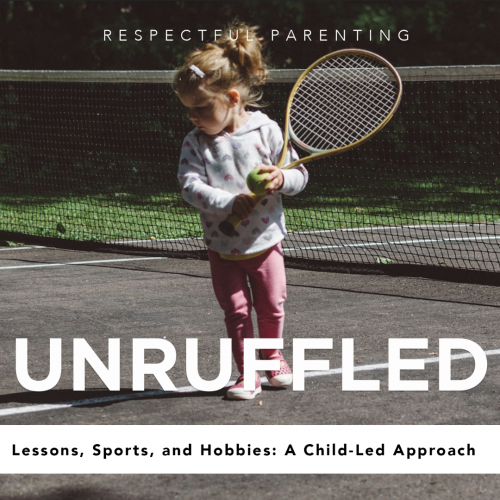
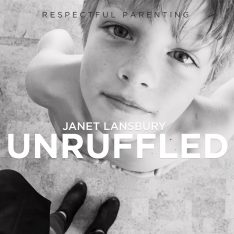
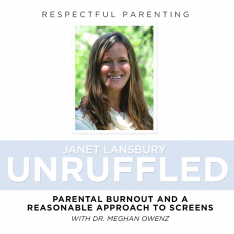


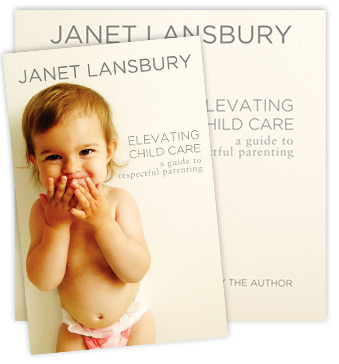

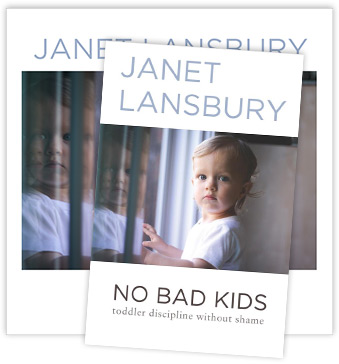



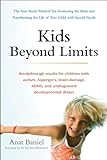
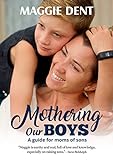

I love this so much. I could not love this more. And I feel seen by you Janet, today, right now. When other families are doing all the activities every season all year weekdays and weekends.. and my family spends our time doing very few of the activities, I wonder how they are motivated to do it. My children are 7 and 6, homeschooled, and just trying their very first lessons/activities this year, and only 1 at a time. To pick up one activity requires putting down the initial one. And taking turns unless both children are participating in the same class such as swimming lessons this summer. My youngest, age 2, needs abundant time plodding around the back yard and for his family to take the same joy as he does in making mud pies. He needs time for baby led weaning painting his placemat with his lunch while the rest of the family eats and chats and marvels and tells stories of when the other two children did the same thing when they were this age. If we were hustling back and forth when would this happen? Child led participation and self motivated engagement is thrilling to observe and to hold space for, trusting that it will happen at the right time. I am in circles where I often feel like the odd duck choosing my self care of serving family dinner and protecting plentiful down time for my kids to play and making sure our schedules are wide open for trips to the library or spending extra time at an errand to observe and discuss how things work.
Thank you for your words and thoughts and how you offer them “in my (your) voice” as it is testimony of your life and experience which is incredibly valuable because every person’s testimony and experience is. Choosing to trust a child, for me, takes occasional course correction on my part so that I can let go of matters that I start to take into my own hands and instead let them hang in the air instead where they belong. I have been reading your writings for about 6 years now and this is my first time posting because this really is perpendicular to modern family life. Please keep sharing, your perspective and heart have changed my life and countless others’. I could go on and on but thank you and “Yes!”.
I say this to witness to the impact your kindness has had and continues to have on the life of 1 family. Just earlier this evening I was fretting over the vision I have for my family and the barriers to living it, these concepts had been asked of me recently and I’ve been stewing over it. I have my eyes on my children and I together and as individuals loving our neighbors as our selves. That is my vision that is the mission. To me that means big things and many small things. I want for us to serve and care as we have been served and cared for. At this time though, my children’s basic developmental needs and my young family’s neediness when it comes to care is still great. Caring and caregiving takes so much time! I sometimes get impatient that we are not further along in our (my) mission to go out and love because laying the foundation required is so consuming. I am reminded that the investment we make now will have significance when the time comes to go out together or scatter and return. The love this mother pours out today is not for nothing-it is of critical importance for the soul that receives it. I can and must love and serve well now the ones I have been given to love and serve. Right now the mission is here and the mission is now. The barrier is thinking that the mission is something of more importance and discounting or hurrying it. In tending my young family I am being a steward of what I have been given that we might return the gift when the time is full. Reading your post and learning of a text with title referring to a hurried child brings fierce sadness and a protectiveness to my nervous system. Long live childhood and applause to you Janet and RIE-folk for nurturing while you are given the privilege. Love above all else.
Hi,
I mostly agree with this approach.
My son plays soccer for some time now and really loves it. I would never enroll him to other sports without his explicit which.
But there is one exception for me.
We live next to the biggest rivers in the country, a small river is 2 mins walking and a lake just 5 mins away by bike .
Thus all these places can be reached easily as soon as the kids are allowed to play without parents supervision outside.
This is the reason why I enrolled him in swimming lessons. He did not like it in the beginning, but as soon as he was able to swim without aids he really started to enjoy it.
How do you handle such dilemmas?
We have the same dilemma. We live in an area with a lot of natural/man-made bodies of water; in fact, right next to a park with a river running through it. During summer time, kids from the neighbourhood come here to swim, so our son (who is four) has been interested in water since he was aware of swimming as a possibility. We asked him if he would like to start swimming and he said yes. We brought him to the pool to see what it looked like and he seemed excited by the prospect. Then he had his first class and it was clear that he’s not entirely comfortable – he doesn’t want to put his head underwater and spits and rubs his face whenever he has to put his face in the water, even a little.
It got worse during the second class. He went to the toilet for a long time in the middle of class, and sat out on a lot of the exercises. I don’t think he’s enjoying himself but whenever I ask him, he says he likes it.
He had the same experience getting used to (pre)school – he found it nerve-wrecking (he said he was “nervous” before school for the first few days) and often went to the toilet and spent a long time there stalling, to the point that his teacher had to go look for him. It took a few months for him to get used to school and now he loves it.
Should we let him continue? Swimming is not school, after all – he could start later. The problem is that he says he likes it even though it seems clear to me (and my husband) that he is not enjoying himself during the classes. Do I listen to him or should I go with what I’m seeing?
Thank you, that resonates so much with me. I am trying to find my way with these things and this put so many things into words I am struggling to know. The difficulty is that I have to be so aware what I want and what us actually good for the kids.
With my oldest I had to learn it the hard way. I suggested she go to a sining group after Kindergarten and she was very happy to go and never said anything against it and participated just fine. Only she had a fever about every other week after the group. I had to realize it was just too much for her and pull her out.
I still feel bad sometimes because my kids don‘t swim as well (or at all). But thinking about enrolling them in a swim class, how stressful that would be I decided against and instead for going to have a swim with them and my mum (who is a swim teacher) a couple of times and they not only had fun but actually learned a lot playing with grandma and mum.
When my oldest wanted to play the violin at 8 I let her and she is soaring. She is already overtaking kids who played a year longer because she was just ready.
Your article also gives me courage to enroll my 4-yo in Cello lessons. He has been talking about it ever since Christmas but remembering his sister at that age I thought I should wait, but he really wants it. So maybe we could just give it a try. And if I habe to pull him out – no harm done.
It is possible for kids to be influenced by other kids though. My second thought she should do ballet like her older sister – and after two classes only screamed. We tried twice – both times she initiated it. The third time I just said no. Somehow she felt she had to do it.
Thank you so much for the article. I just know reading you is always so good if I can take the time.
Thank you so much for this! This resonates with me so much. My oldest is 4.5 and thought we haven’t gotten into activities yet, I’ve already planned to not “sign him up for too much” and have no interest in having my weekends filled with things. But this feels like it’s giving me the permission I needed to just let him decide and not push anything and I LOVE that. Thank you for this.
This is a powerful perspective, thanks Janet. We have followed this logic with our five year old daughter, who is very happily home with us and engages in a lot of free and self directed play. I’m wondering how to approach this notion of “waiting” when some anxiety appears to be in the mix. Recently she will ask to do something (sometimes something simple that I know she loves, like time spent with a grandparent, but she also came up with the idea of a tennis lesson) but when the moment comes to leave home and separate from us, she is overcome with anxiety and emotion and no longer wants to see the plan through. She’s often then upset if she misses out, but in the moment it feels so wrong to push her through her anxiety (clinging to us, crying etc). I’m worried she is starting to miss out on things she truly wants because she has convinced herself she cannot even temporarily be away from us. A lot of activities at this age are drop off or don’t allow direct involvement from parents. I’m not sure where the line is between honouring her nerves and encouraging her to push through. I’d love your take on this.